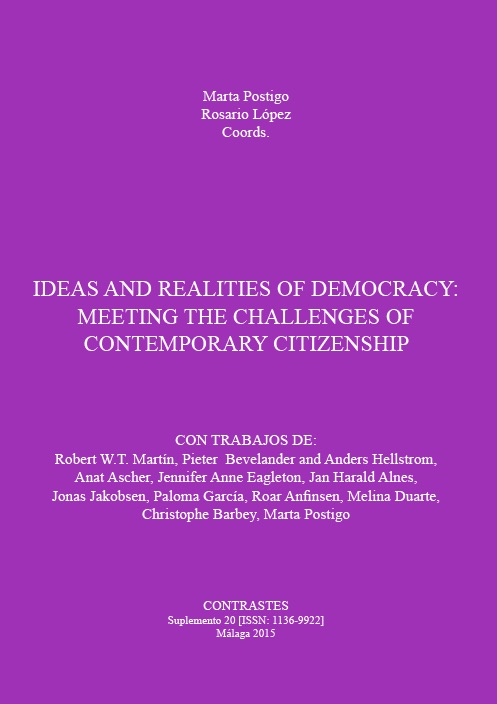The European Union as a Cosmopolitan Civic Space: Conceptual Backgrounds and Contemporary Challenges
DOI:
https://doi.org/10.24310/Contrastescontrastes.v20i3.2424Keywords:
CIUDADANÍA EUROPEA, COSMOPOLITISMO, FEDERALISMO, LIBRE CIRCULACIÓN DE PERSONAS, UNIÓN EUROPEAAbstract
A comienzos del siglo veintiuno, la independencia y la soberanía absolutas de los estados son asuntos acuciantes. La emergencia de entidades supranacionales como las Naciones Unidas y la Unión Europea tras las Segunda Guerra Mundial plantea nuevos retos a la hegemonía política y la soberanía de los estados. De hecho, el proceso de integración europea obliga a reconsiderar conceptos y procedimientos básicos de la democracia representativa y de la ciudadanía más allá del marco del estado-nación. Este artículo se centra en la dimensión cívica del proceso de integración europea y discute los logros y debilidades de la Unión Europea con respecto a la libre circulación de ciudadanos y el desarrollo de una ciudadanía europea.
Downloads
Metrics
Publication Facts
Reviewer profiles N/A
Author statements
Indexed in
-
—
- Academic society
- N/A
- Publisher
- Universidad de Málaga
Downloads
Published
How to Cite
Issue
Section
License
This journal provides immediate free access to its content under the principle of making research freely available to the public. All content published in Contrastes. Revista Internacional de Filosofía, are subject to the Creative Commons Attribution-NonCommercial-ShareAlike 4.0 license whose full text can be found at <http://creativecommons.org/licenses/by-nc-sa/4.0>
It is the responsibility of the authors to obtain the necessary permissions of the images that are subject to copyright.
Authors whose contributions are accepted for publication in this journal will retain the non-exclusive right to use their contributions for academic, research and educational purposes, including self-archiving or repository in open access repositories of any kind.
The electronic edition of this magazine is edited by the Editorial Service of the University of Malaga (Uma Editorial), being necessary to cite the origin in any partial or total reproduction.










5.png)
